MASLD/MASH Learning Center

Alcohol and MASLD/MASH: Navigating the Complex Relationship

In this insightful session from the GHAPP MASLD Community Network, Alison Moe, PA-C, dives into the complex and often misunderstood relationship between alcohol use and metabolic dysfunction–associated steatotic liver disease (MASLD). Drawing from clinical experience, Alison explains why accurately screening, quantifying, and discussing alcohol consumption with patients is essential to understanding disease progression, treatment eligibility, and overall liver health. She outlines how continued alcohol use can alter liver function tests (LFTs), confound noninvasive test results, and affect candidacy for emerging MASH pharmacotherapies. Viewers will learn how to approach sensitive conversations about drinking habits without stigma, interpret AASLD alcohol threshold guidelines, and apply effective counseling strategies for patients with combined alcohol-related and metabolic liver disease. Alison also discusses the role of PEth urine testing, lifestyle counseling, and the importance of complete abstinence for those with advanced fibrosis. This educational talk provides clinicians with actionable insights to support patients in improving their metabolic and liver health through honest communication, behavioral change, and evidence-based management.
Watch Now

NITs: A Practical Overview: Navigating the Basics

Learn how non-invasive testing (NITs) is transforming fibrosis assessment in patients with MASLD and MASH. In this educational talk, Sarah Dawkins, NP, from Duke University Liver Clinic, breaks down the differences between simple steatosis (MASLD) and steatohepatitis (MASH), explains when and how to use serum-based tests like FIB-4 and ELF, and explores the advantages and limitations of imaging tests such as FibroScan and MRI elastography. Discover how to interpret results, avoid false positives, and determine when hepatology referral or biopsy is needed. Perfect for clinicians managing metabolic liver disease and looking to integrate non-invasive testing into everyday practice.
Watch Now
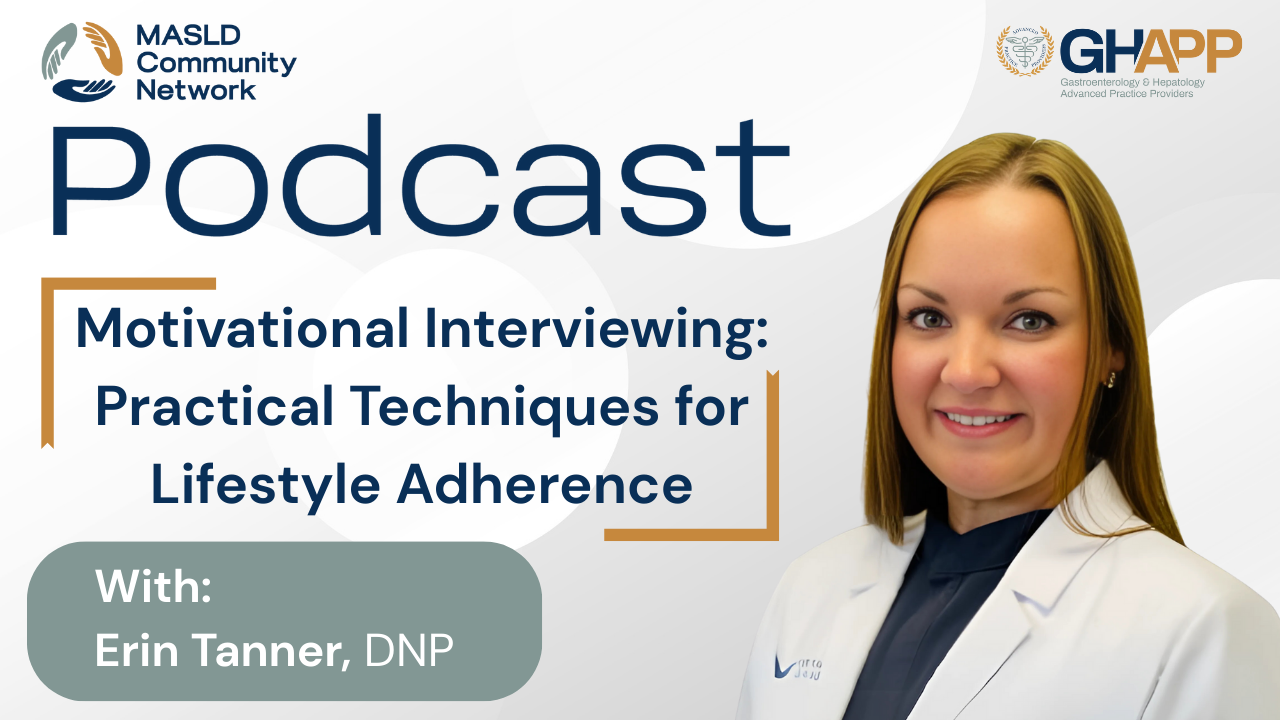
Motivational Interviewing: Practical Techniques For Lifestyle Adherence

In this engaging session from the GHAPP MASLD Community Network, Erin Tanner, DNP, from Gastro Health in Birmingham, Alabama, discusses how motivational interviewing can empower patients with fatty liver disease to make meaningful lifestyle changes. Drawing from over 14 years of experience in hepatology and gastroenterology, Erin explains how a collaborative, patient-centered approach can improve adherence to diet, exercise, and weight management plans. Using the RULE framework—Resist the righting reflex, Understand motivation, Listen with empathy, and Empower the patient—she demonstrates practical ways to foster trust and promote behavior change without judgment. Erin also introduces the SMART goals method (Specific, Measurable, Achievable, Relevant, Time-bound), guiding clinicians on how to set realistic, personalized goals that patients can achieve and sustain. Through reflective listening, affirmation, and consistent follow-up, providers can help patients overcome ambivalence, build confidence, and stay motivated on their journey to better liver and metabolic health.
Watch Now
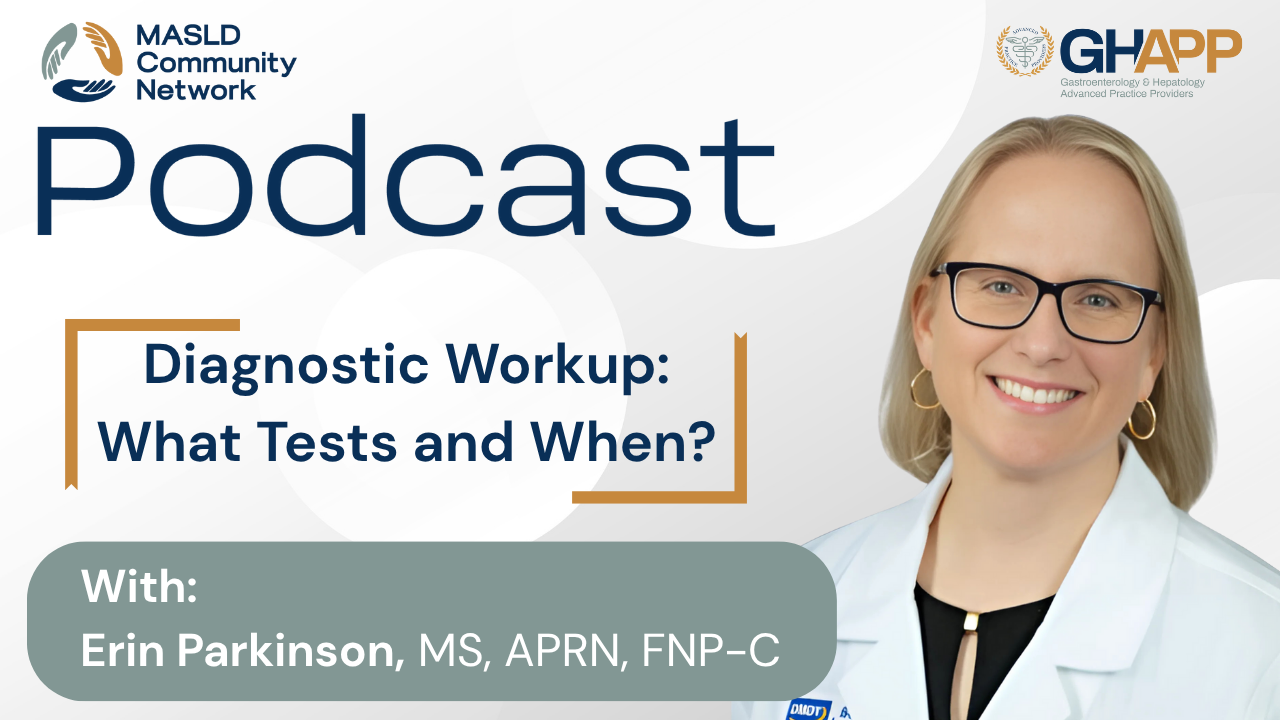
Diagnostic Workup: What Tests and When?

In this educational session from the GHAPP MASLD Community Network, Erin Parkinson, APRN, from the Transplant Institute at Tampa General Medical Group, provides a detailed walkthrough of the diagnostic workup for metabolic dysfunction–associated steatotic liver disease (MASLD) and metabolic dysfunction–associated steatohepatitis (MASH). With experience in both general and transplant hepatology, Erin explains how to identify and evaluate patients at risk—beginning with key metabolic risk factors such as obesity, diabetes, and hypertension, and moving through the essential steps of imaging, laboratory testing, and fibrosis assessment. Viewers will learn when and how to use tools like ultrasound, FIB-4, FibroScan, ELF testing, and MR elastography to differentiate mild disease from advanced fibrosis or cirrhosis. Erin also emphasizes the importance of quantifying alcohol intake, ruling out viral, autoimmune, and genetic liver diseases, and applying risk stratification to determine appropriate follow-up and hepatology referral. This comprehensive overview equips APPs and clinicians with the practical framework needed to confidently diagnose, stage, and monitor MASLD and MASH, while incorporating HCC screening and long-term management strategies for high-risk patients.
Watch Now
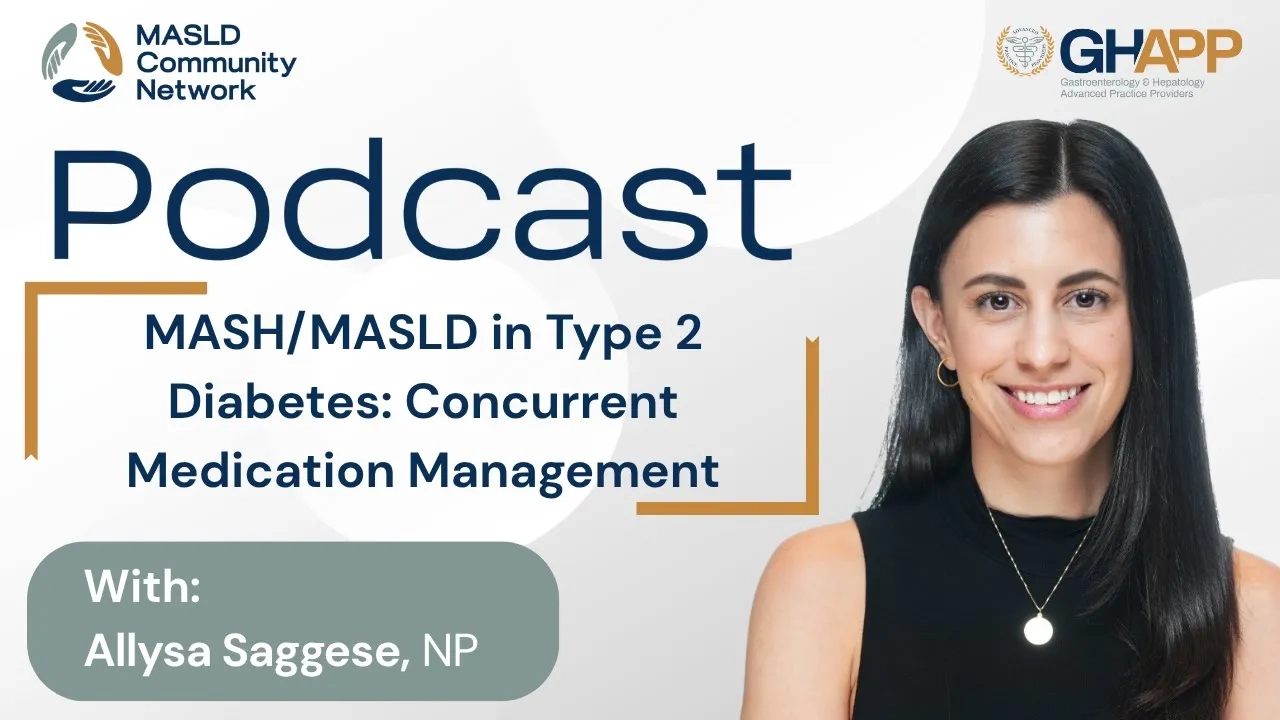
MASH/MASLD in Type 2 Diabetes: Concurrent Medication Management

In this in-depth educational discussion from the GHAPP MASLD Community Network, Allysa Saggese, NP, from Weill Cornell Medicine in New York City, explores the critical intersection between type 2 diabetes, metabolic dysfunction–associated steatotic liver disease (MASLD), and metabolic dysfunction–associated steatohepatitis (MASH). Allysa explains why patients with diabetes are at higher risk for developing MASH and advanced fibrosis, detailing how insulin resistance, excess glucose, and fat accumulation drive inflammation and liver damage. She reviews the most common diabetes medication classes—including metformin, GLP-1 receptor agonists, SGLT2 inhibitors, TZDs (pioglitazone), and DPP-4 inhibitors—and discusses their impact on liver fat, inflammation, and fibrosis, highlighting which options offer the most dual benefit for both glycemic and liver health. Viewers will learn how to approach medication selection and sequencing, when to use caution in cirrhosis or decompensated liver disease, and how to tailor treatment to each patient’s metabolic profile. With clear clinical reasoning and practical insights, Allysa provides a concise roadmap for optimizing diabetes management in patients with MASLD and MASH—balancing glycemic control, liver protection, and overall metabolic wellness.
Watch Now
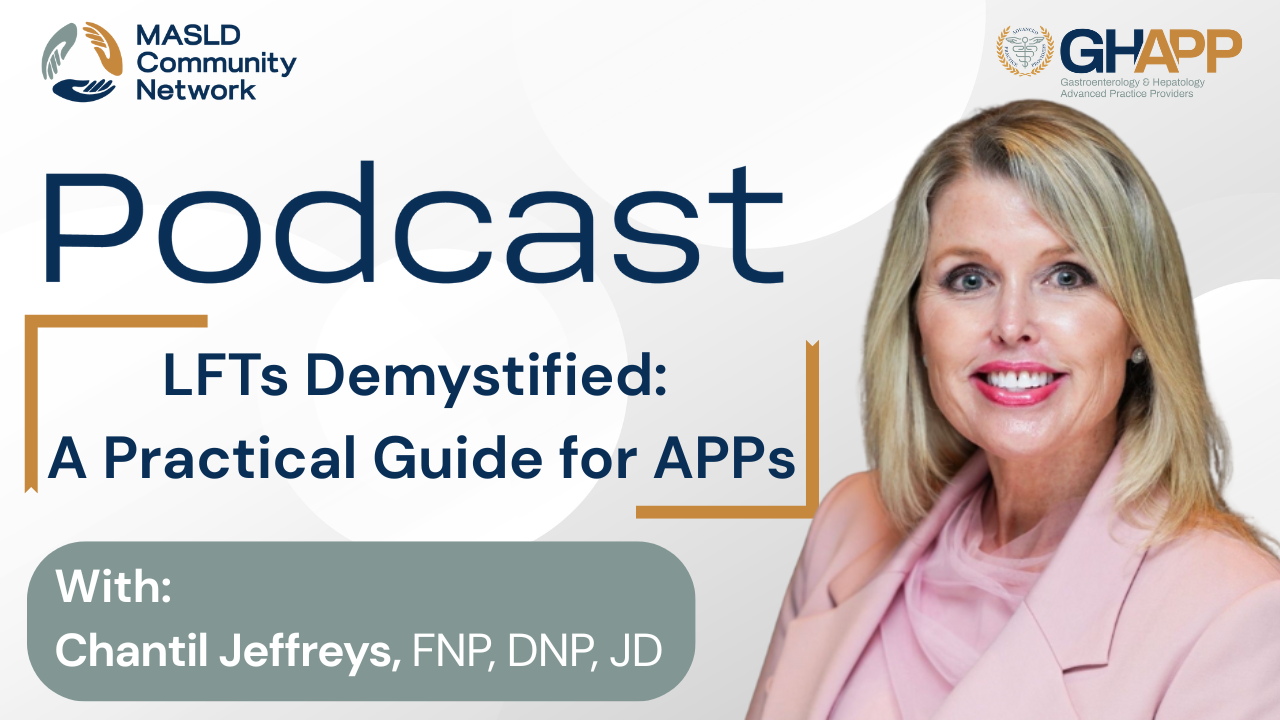
LFTs Demystified: A Practical Guide for APPs

In this episode of Liver Functions Demystified, Chantil Jeffreys, FNP from Gastro One in Memphis, Tennessee, shares a practical guide for interpreting liver enzyme results and identifying when to evaluate patients for MASLD (metabolic dysfunction–associated steatotic liver disease) and MASH (metabolic dysfunction–associated steatohepatitis). Drawing from 24 years of clinical experience, she explains how to recognize key patterns such as persistent ALT and AST elevations, the significance of ALT being higher than AST in early MASH, and why associated metabolic risk factors—like type 2 diabetes, obesity, hypertension, and hyperlipidemia—make even mild elevations clinically important. Chantil also reviews the role of other markers including GGT, alkaline phosphatase, bilirubin, albumin, and INR in assessing disease severity and progression. She highlights how to differentiate MASH from alcohol-associated liver disease, viral hepatitis, and drug-induced liver injury, and underscores the importance of serial monitoring to track improvement or progression. This video offers a clear, practical framework for clinicians, APPs, and primary care providers to better evaluate and manage patients with liver disease in everyday practice.
Watch Now

NITs: A Practical Overview: Navigating the Basics

Join Renee Pozza, a hepatology nurse practitioner with more than 25 years of experience, as she breaks down the essentials of non-invasive testing and fibrosis assessment in patients with metabolic-associated steatotic liver disease (MASLD) and metabolic-associated steatohepatitis (MASH). In this educational session, Renee reviews how to identify patients early, interpret key laboratory scores such as FIB-4 and ELF, and apply imaging tools like FibroScan® and MRE to evaluate liver fat and fibrosis. Learn how to distinguish simple steatosis from progressive fibrosis, recognize markers of advanced liver disease, and integrate non-invasive tests into clinical workflows across primary care, GI, endocrinology, and hepatology settings. Renee also highlights when to consider pharmacologic interventions—including resmetirom and GLP-1 therapies—and when to refer to hepatology for advanced fibrosis or cirrhosis. For more expert-led resources on MASLD, MASH, and liver health, visit the MASLD Community Network to access webinars, clinical insights, and continuing education for advanced practice providers.
Watch Now
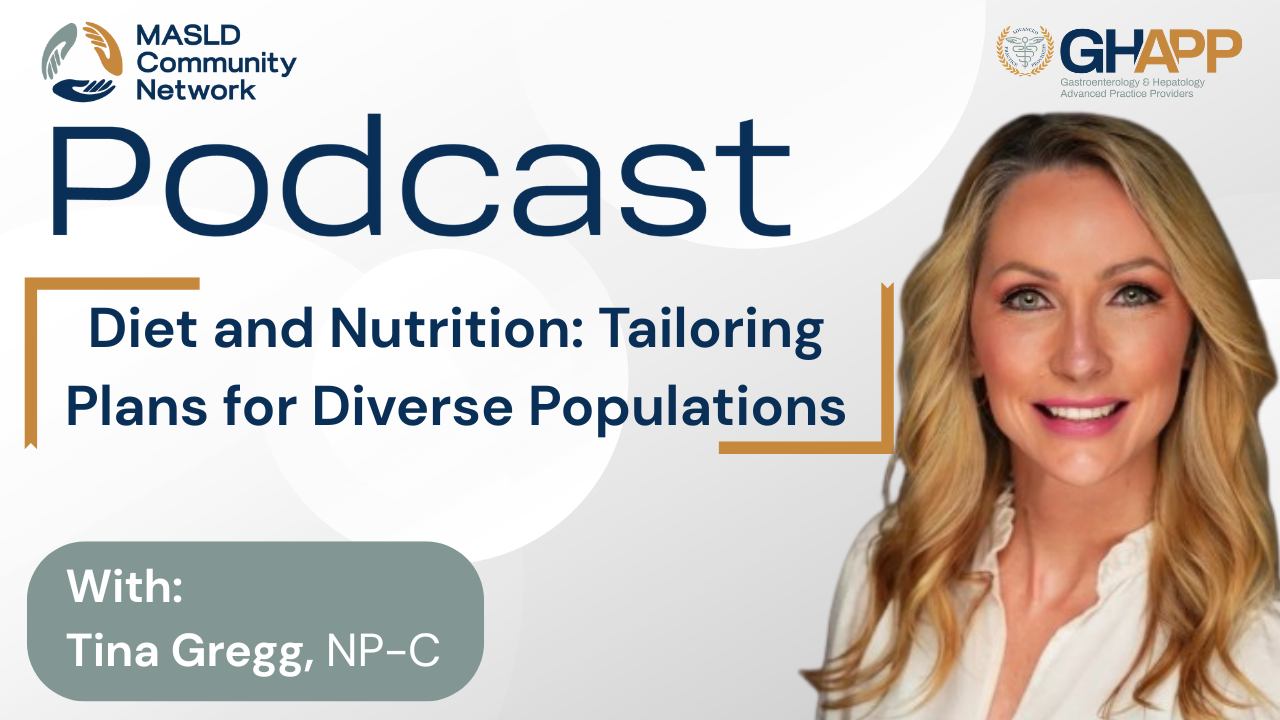
Diet and Nutrition: Tailoring Plans For Diverse Populations

In this presentation, Tina Gregg, NP-C, from GI Associates, shares practical, evidence-based strategies for nutrition and lifestyle management in MASLD and MASH. With nearly two decades of experience caring for patients with liver disease, Tina emphasizes that lasting improvement requires more than telling patients to “lose weight”—it calls for tailored, culturally sensitive, and sustainable dietary guidance. She explores data supporting the Mediterranean diet, DASH diet, low- and moderate-carbohydrate approaches, intermittent fasting, and plant-based eating, detailing how each can reduce liver fat, improve insulin sensitivity, and decrease inflammation. Tina also discusses how to adapt these principles for patients’ cultural preferences, socioeconomic barriers, and comorbidities such as diabetes, CKD, and hyperlipidemia. This session, part of the GHAPP MASLD & MASH Community Network, highlights how APPs can guide patients toward realistic dietary changes that enhance both liver and metabolic health.
Watch Now
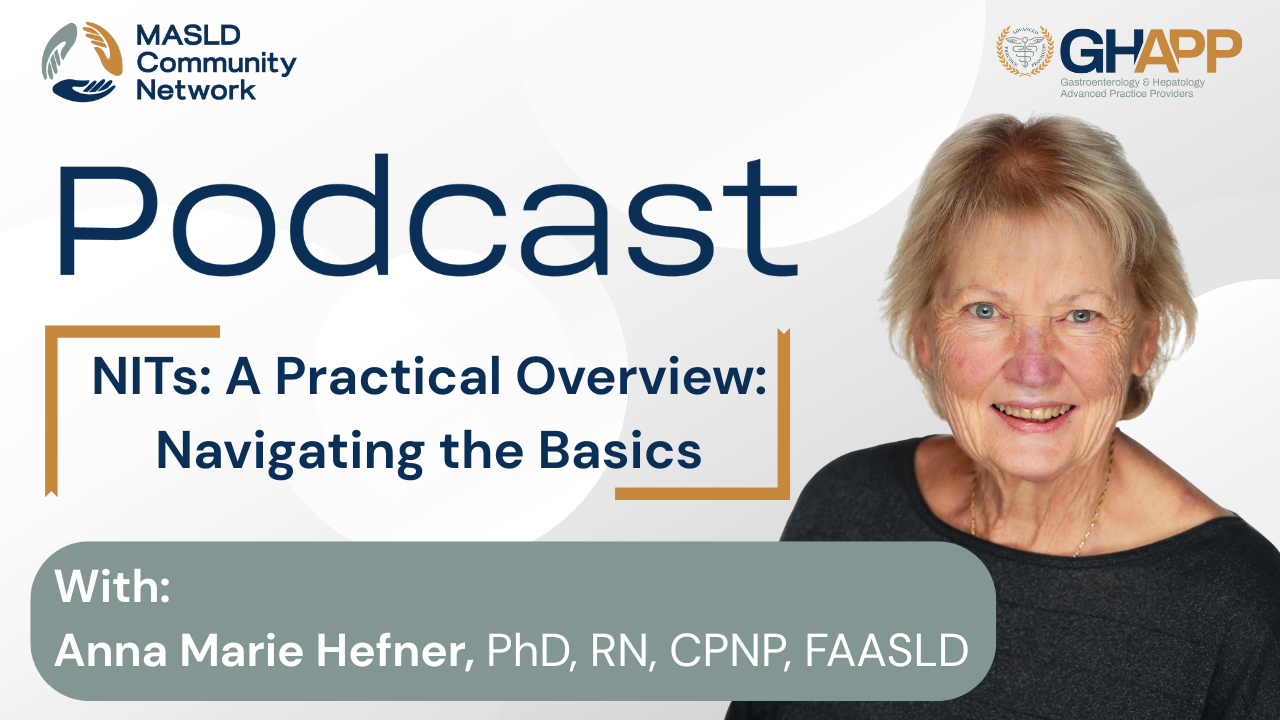
NITs: A Practical Overview: Navigating the Basics

In this informative session, Anna Marie Hefner, CPNP, a hepatology nurse practitioner at the Southern California Liver and GI Center, shares her 15+ years of experience managing patients with MASLD (Metabolic Associated Steatotic Liver Disease) and MASH (Metabolic Associated Steatohepatitis). She explains how her clinic has created a collaborative, patient-centered approach—hosting dedicated fatty liver clinics that foster education, peer support, and lifestyle discussion among patients. Anna Marie walks viewers through how to distinguish between simple steatosis and MASH, emphasizing that proper diagnosis drives appropriate management—from lifestyle counseling and diet modification for early stages to medication and specialist referral for advanced fibrosis or cirrhosis. She offers a detailed overview of non-invasive tests (NITs) such as FIB-4, ELF, FibroScan, and MRI elastography, outlining how each test is performed, how to interpret key cutoff values, and when to refer patients to hepatology. She also highlights the importance of evaluating comorbidities, including cardiovascular and metabolic risk factors, medication history, and family health background, as part of comprehensive liver assessment. Finally, she encourages providers to follow AASLD and EASL guidelines, utilize collaborative care across specialties, and engage with professional APP organizations like GHAPP to stay current on evolving best practices in fatty liver disease management.
Watch Now
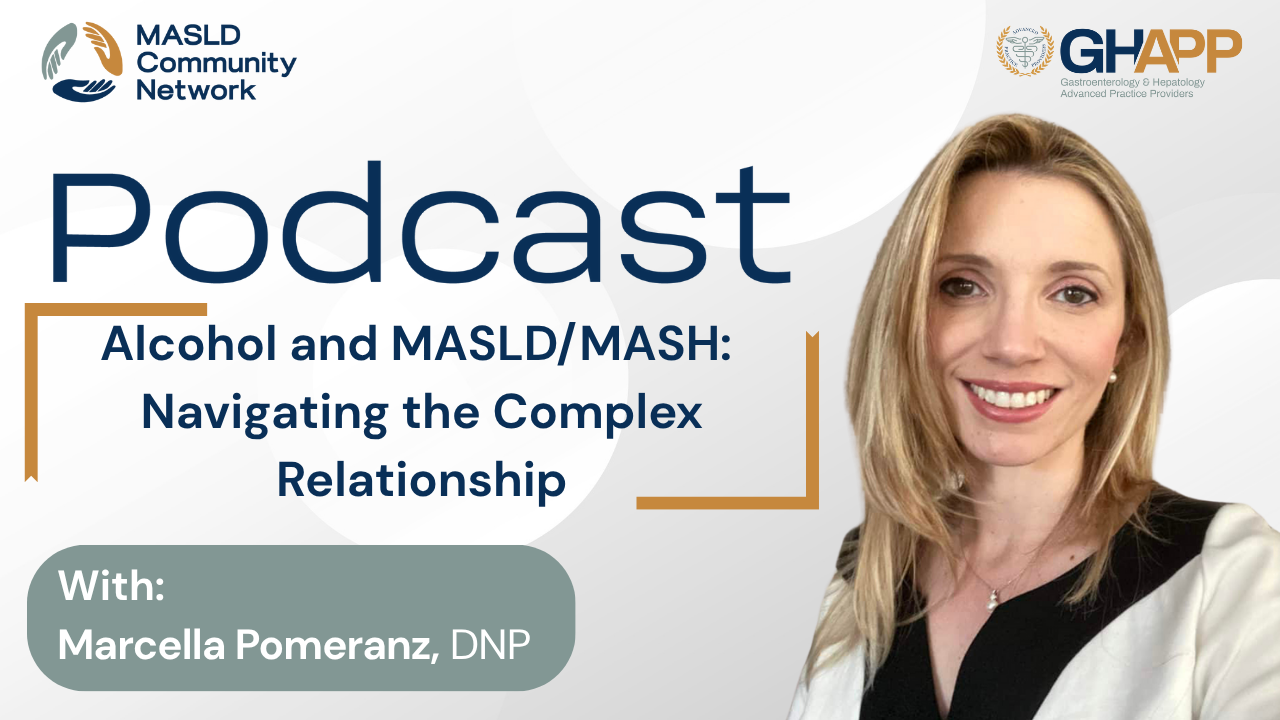
Alcohol and MASLD/MASH: Navigating the Complex Relationship

In this insightful presentation, Marcella Pomeranz, DNP, lead nurse practitioner at Digestive Associates in Las Vegas, shares practical strategies for managing patients with alcohol use and MASLD. Drawing on her experience leading a team of 12 APPs, Marcella explains how to effectively screen for alcohol consumption, build trust and openness with patients, and use tools like the AUDIT-C and phosphatidylethanol (PEth) testing to accurately assess alcohol intake and monitor progress. She highlights the synergistic relationship between alcohol and metabolic dysfunction, emphasizing how even low to moderate alcohol use can accelerate liver injury, fibrosis, and the progression to cirrhosis or hepatocellular carcinoma. Marcella breaks down the biological mechanisms behind this interaction—oxidative stress, inflammation, mitochondrial dysfunction, and increased gut permeability—and provides evidence-based advice on lifestyle modification, structured support programs such as AA and addiction medicine referrals, and potential roles for GLP-1 therapies in managing both metabolic and behavioral aspects. She also discusses the importance of interpreting non-invasive tests (NITs) like FibroScan and serum markers in the context of recent alcohol use, using them as motivational tools to show patients measurable improvement. This session offers real-world clinical guidance for APPs, GI providers, and hepatology teams working to reduce risk and optimize care for patients with alcohol-associated MASLD and MASH.
Watch Now
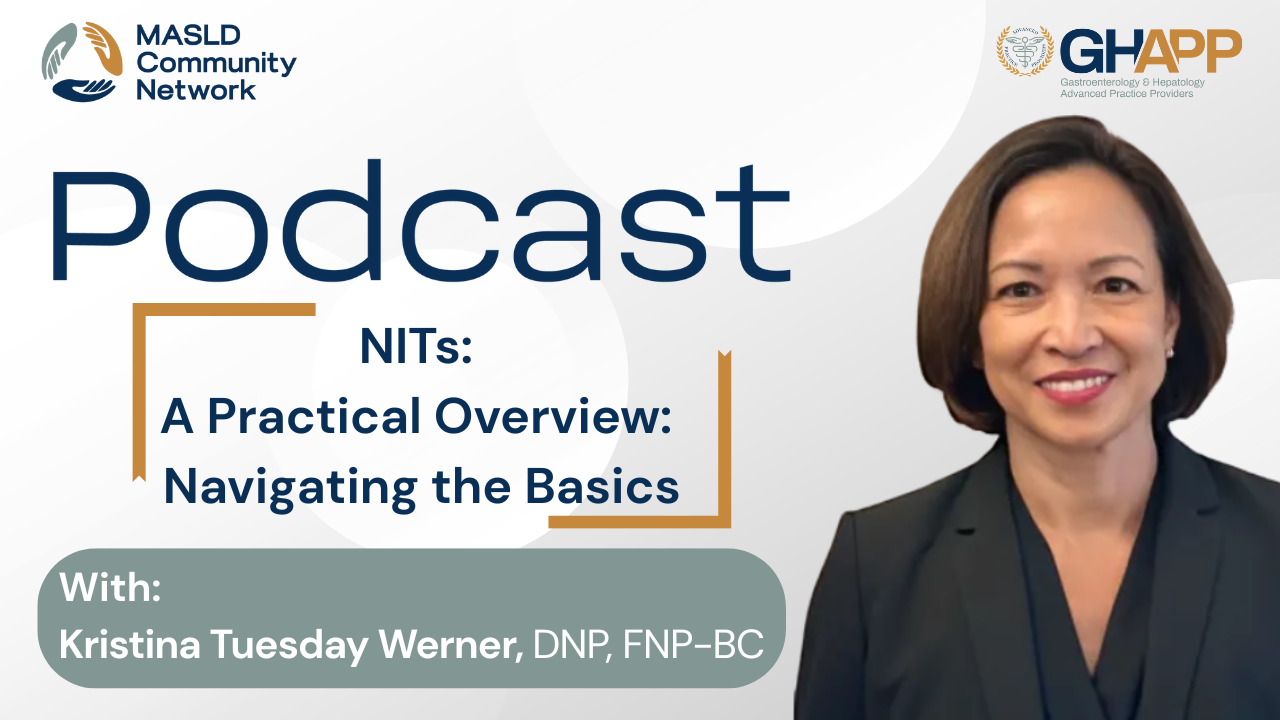
NITs: A Practical Overview: Navigating the Basics

In this educational session, Tuesday Werner, DNP, from Mayo Clinic Arizona, provides an in-depth overview of non-invasive testing (NITs) and their critical role in the diagnosis and management of MASLD (Metabolic Associated Steatotic Liver Disease) and MASH (Metabolic Associated Steatohepatitis). With over 20 years of experience in hepatology, she breaks down the fundamental differences between simple steatosis (MASLD) and inflammatory steatohepatitis (MASH), explaining why identifying fibrosis risk through non-invasive methods—such as FIB-4, NFS, ELF, FibroScan (VCTE), and MRE—is essential for guiding patient management, referrals, and surveillance. Tuesday discusses the strengths and limitations of serum-based vs. imaging-based NITs, emphasizing their complementary roles in evaluating fibrosis and preventing unnecessary biopsies. She also outlines how to integrate NIT results with patient history, comorbidities, and liver function tests to determine monitoring intervals and hepatology referrals. Viewers will learn key thresholds and cutoff values for interpreting FIB-4 and liver stiffness measurements, helping to stratify patients into low-, moderate-, and high-risk categories for advanced fibrosis or cirrhosis. This session underscores how NITs are transforming liver care—allowing for early detection, better patient stratification, and proactive management of MASLD and MASH through evidence-based, non-invasive approaches.
Watch Now
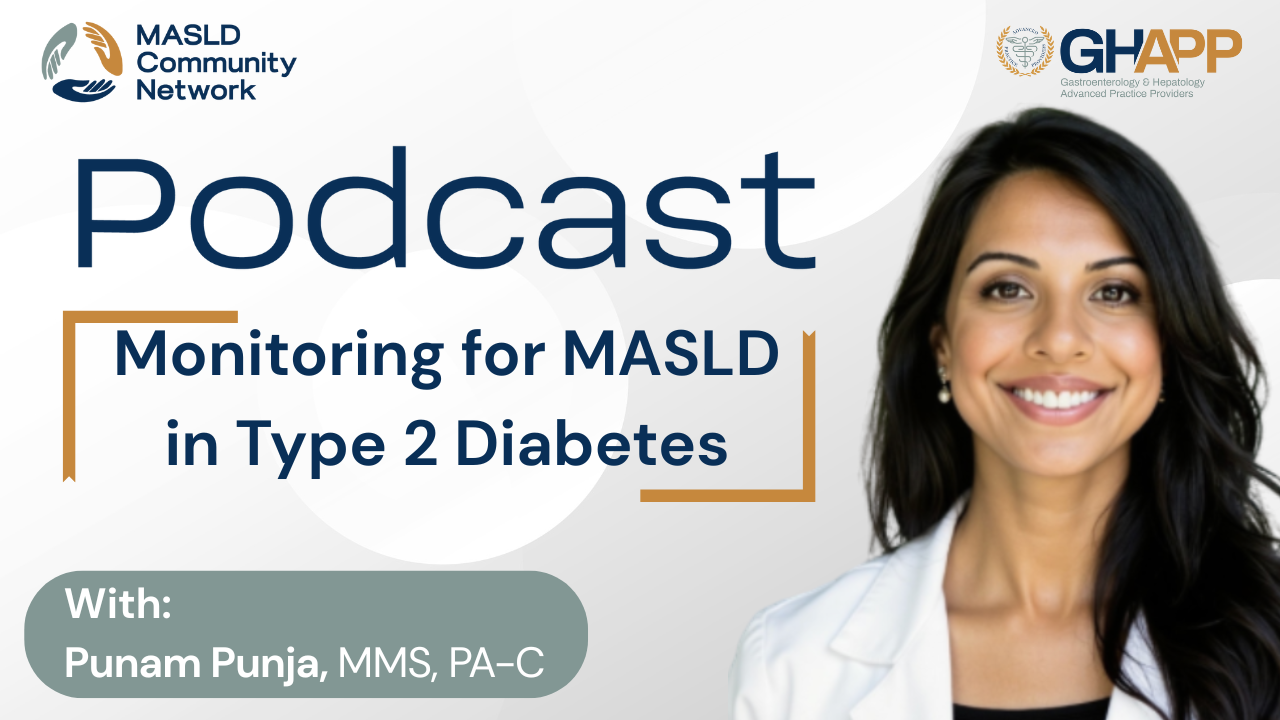
Monitoring for MASLD in Type 2 Diabetes

In this educational session, Punam Punja, MMS, PA-C, from Emory Healthcare in Atlanta, discusses the crucial connection between type 2 diabetes and MASLD (Metabolic Dysfunction–Associated Steatotic Liver Disease). With over 15 years of hepatology experience, Punam outlines a practical, evidence-based approach for screening and monitoring patients with type 2 diabetes who are at risk for MASH (Metabolic Associated Steatohepatitis). She explains how the American Diabetes Association (ADA) now recommends routine fibrosis screening using the FIB-4 index, a simple, non-invasive calculation that helps identify patients at risk for advanced fibrosis — the strongest predictor of liver-related outcomes. Punam breaks down risk thresholds, screening intervals, and the role of secondary assessments such as transient elastography or ELF testing. She also emphasizes the importance of patient education, noting that unlike diabetic complications such as retinopathy, MASH is often silent but reversible with lifestyle modification. As October marks National Liver Awareness Month, Punam encourages APPs to make liver screening a standard part of diabetes care.
Watch Now




